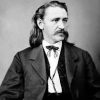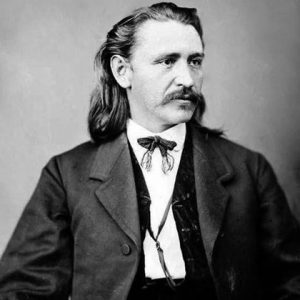calsfoundation@cals.org
Elias Cornelius Boudinot (1835–1890)
Elias Cornelius Boudinot was a mixed-lineage Cherokee lawyer, newspaper editor, and lobbyist. He was active in civic life and Democratic Party politics in Arkansas during the Civil War era, serving in the Confederate Cherokee forces and the Confederate Congress during the conflict. In the following years, he maintained close connections with leading Democratic politicians in Arkansas while engaging in legal, economic, and political activities.
Elias Cornelius Boudinot was born on August 1, 1835, in New Echota, Georgia, to Elias Boudinot, who was Cherokee, and his white wife, Harriet Gold. He was one of six siblings. After the assassination of his father in 1839 in Indian Territory (present-day Oklahoma), the Gold family raised the Boudinot children in the East.
Boudinot returned to Indian Territory and began studying law in Fayetteville (Washington County) in 1853. In 1859, Boudinot was elected to the city council and, with James Pettigrew, started the Arkansian in Fayetteville. A supporter of U.S. Senator Robert W. Johnson, Boudinot became chairman of the Arkansas State Democratic Central Committee, and when Congressman Thomas C. Hindman challenged the Johnson faction, Boudinot defended Johnson and became an editor for the True Democrat of Little Rock (Pulaski County).
In 1861, David Walker of Fayetteville was elected chairman of the Secession Convention, and Boudinot became secretary. When Arkansas entered the Confederacy, Boudinot helped Stand Watie, his uncle, enlist Confederate Cherokee troops and assisted Albert Pike in making a Confederate treaty with the Cherokee. Rising to the rank of lieutenant colonel, Boudinot fought in the Battle of Pea Ridge in Arkansas and the Battle of Locust Grove in Indian Territory. When Cherokee principal chief John Ross deserted the Confederacy and Watie became the principal chief of the Southern Cherokee, Boudinot became the Cherokee delegate to the Confederate Congress. He again served on the battlefield as a volunteer aide-de-camp for his old political foe, Major General Hindman, at the Battle of Prairie Grove.
Boudinot engaged in treaty negotiations for the Southern Cherokee after the war. Although he failed to achieve his aims, under a reunited tribal government, he became a member of the Cherokee delegation in Washington DC. He left the delegation in 1868, just before being named a delegate from Arkansas at the National Democratic Convention.
Boudinot was undertaking legal work and seeking business ventures when, in 1869, the tobacco factory belonging to Watie and himself was confiscated for failure to pay federal excise taxes. The U.S. Supreme Court ruled against their appeal even though the Cherokee Treaty of 1868 supported their actions, and, in response, Boudinot began to call for Indians to be made citizens of the United States and protected by the Constitution.
Over the next two decades, Boudinot promoted his views on Indian policy, notably in testimony before congressional committees, while still practicing law, delivering lectures, and lobbying for railroads. He stayed controversially active in Cherokee politics. In fact, his letter to the Chicago Times in 1879 about unclaimed land in Indian Territory inspired the Boomer Movement—the influx of white settlers into Indian Territory. Often lacking funds, however, Boudinot turned to his friends, including Congressman Thomas Montague Gunter from Arkansas, who hired Boudinot as his private secretary in 1874. Boudinot also received some paid committee clerkships. When Gunter left the Congress, Boudinot became the secretary to U.S. Senator James David Walker of Arkansas. In 1885, Boudinot sought to be appointed Commissioner of Indian Affairs. He failed despite support from Arkansas politicians and others in the West.
In 1885, Boudinot married Clara Minear; they had no children. They moved to Fort Smith (Sebastian County), where he practiced law. In addition, he maintained a ranch in the Cherokee Nation.
Boudinot died unexpectedly from dysentery on September 27, 1890. He is buried in Oak Grove Cemetery in Fort Smith.
For additional information:
Adams, John D. Elias Cornelius Boudinot: In Memoriam. Chicago: Rand McNally, 1890.
Colbert, Thomas Burnell. “Prophet of Progress: The Life and Times of Elias Cornelius Boudinot.” PhD diss., Oklahoma State University, 1982.
———. “Visionary or Rogue: The Life and Legacy of Elias Cornelius Boudinot.” Chronicles of Oklahoma 65 (Fall 1987): 268–281.
Parins, James W. Elias Cornelius Boudinot: A Life on the Cherokee Border. Lincoln: University of Nebraska Press, 2006.
Thomas Burnell Colbert
Marshalltown Community College








Comments
No comments on this entry yet.